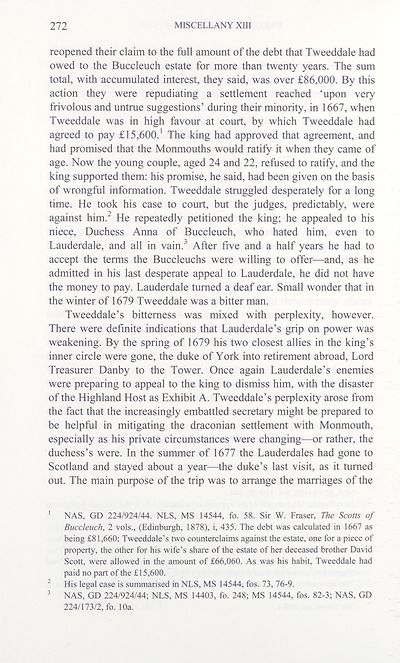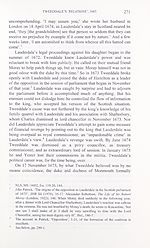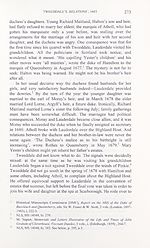Series 5 > Miscellany [of the Scottish History Society] XIII
(287) Page 272
Download files
Complete book:
Individual page:
Thumbnail gallery: Grid view | List view

272
MISCELLANY XIII
reopened their claim to the full amount of the debt that Tweeddale had
owed to the Buccleuch estate for more than twenty years. The sum
total, with accumulated interest, they said, was over £86,000. By this
action they were repudiating a settlement reached ‘upon very
frivolous and untrue suggestions’ during their minority, in 1667, when
Tweeddale was in high favour at court, by which Tweeddale had
agreed to pay £15,600.' The king had approved that agreement, and
had promised that the Monmouths would ratify it when they came of
age. Now the young couple, aged 24 and 22, refused to ratify, and the
king supported them: his promise, he said, had been given on the basis
of wrongful information. Tweeddale struggled desperately for a long
time. He took his case to court, but the judges, predictably, were
against him.2 He repeatedly petitioned the king; he appealed to his
niece. Duchess Anna of Buccleuch, who hated him, even to
Lauderdale, and all in vain.3 After five and a half years he had to
accept the terms the Buccleuchs were willing to offer—and, as he
admitted in his last desperate appeal to Lauderdale, he did not have
the money to pay. Lauderdale turned a deaf ear. Small wonder that in
the winter of 1679 Tweeddale was a bitter man.
Tweeddale’s bitterness was mixed with perplexity, however.
There were definite indications that Lauderdale’s grip on power was
weakening. By the spring of 1679 his two closest allies in the king’s
inner circle were gone, the duke of York into retirement abroad, Lord
Treasurer Danby to the Tower. Once again Lauderdale’s enemies
were preparing to appeal to the king to dismiss him, with the disaster
of the Highland Host as Exhibit A. Tweeddale’s perplexity arose from
the fact that the increasingly embattled secretary might be prepared to
be helpful in mitigating the draconian settlement with Monmouth,
especially as his private circumstances were changing—or rather, the
duchess’s were. In the summer of 1677 the Lauderdales had gone to
Scotland and stayed about a year—the duke’s last visit, as it turned
out. The main purpose of the trip was to arrange the marriages of the
1 NAS, GD 224/924/44. NLS, MS 14544, fo. 58. Sir W. Fraser, The Scotts of
Buccleuch, 2 vols., (Edinburgh, 1878), i, 435. The debt was calculated in 1667 as
being £81,660; Tweeddale’s two counterclaims against the estate, one for a piece of
property, the other for his wife’s share of the estate of her deceased brother David
Scott, were allowed in the amount of £66,060. As was his habit, Tweeddale had
paid no part of the £15,600.
2 His legal case is summarised in NLS, MS 14544, fos. 73, 76-9.
3 NAS, GD 224/924/44; NLS, MS 14403, fo. 248; MS 14544, fos. 82-3; NAS, GD
224/173/2, fo. 10a.
MISCELLANY XIII
reopened their claim to the full amount of the debt that Tweeddale had
owed to the Buccleuch estate for more than twenty years. The sum
total, with accumulated interest, they said, was over £86,000. By this
action they were repudiating a settlement reached ‘upon very
frivolous and untrue suggestions’ during their minority, in 1667, when
Tweeddale was in high favour at court, by which Tweeddale had
agreed to pay £15,600.' The king had approved that agreement, and
had promised that the Monmouths would ratify it when they came of
age. Now the young couple, aged 24 and 22, refused to ratify, and the
king supported them: his promise, he said, had been given on the basis
of wrongful information. Tweeddale struggled desperately for a long
time. He took his case to court, but the judges, predictably, were
against him.2 He repeatedly petitioned the king; he appealed to his
niece. Duchess Anna of Buccleuch, who hated him, even to
Lauderdale, and all in vain.3 After five and a half years he had to
accept the terms the Buccleuchs were willing to offer—and, as he
admitted in his last desperate appeal to Lauderdale, he did not have
the money to pay. Lauderdale turned a deaf ear. Small wonder that in
the winter of 1679 Tweeddale was a bitter man.
Tweeddale’s bitterness was mixed with perplexity, however.
There were definite indications that Lauderdale’s grip on power was
weakening. By the spring of 1679 his two closest allies in the king’s
inner circle were gone, the duke of York into retirement abroad, Lord
Treasurer Danby to the Tower. Once again Lauderdale’s enemies
were preparing to appeal to the king to dismiss him, with the disaster
of the Highland Host as Exhibit A. Tweeddale’s perplexity arose from
the fact that the increasingly embattled secretary might be prepared to
be helpful in mitigating the draconian settlement with Monmouth,
especially as his private circumstances were changing—or rather, the
duchess’s were. In the summer of 1677 the Lauderdales had gone to
Scotland and stayed about a year—the duke’s last visit, as it turned
out. The main purpose of the trip was to arrange the marriages of the
1 NAS, GD 224/924/44. NLS, MS 14544, fo. 58. Sir W. Fraser, The Scotts of
Buccleuch, 2 vols., (Edinburgh, 1878), i, 435. The debt was calculated in 1667 as
being £81,660; Tweeddale’s two counterclaims against the estate, one for a piece of
property, the other for his wife’s share of the estate of her deceased brother David
Scott, were allowed in the amount of £66,060. As was his habit, Tweeddale had
paid no part of the £15,600.
2 His legal case is summarised in NLS, MS 14544, fos. 73, 76-9.
3 NAS, GD 224/924/44; NLS, MS 14403, fo. 248; MS 14544, fos. 82-3; NAS, GD
224/173/2, fo. 10a.
Set display mode to:
![]() Universal Viewer |
Universal Viewer | ![]() Mirador |
Large image | Transcription
Mirador |
Large image | Transcription
Images and transcriptions on this page, including medium image downloads, may be used under the Creative Commons Attribution 4.0 International Licence unless otherwise stated. ![]()
| Scottish History Society volumes > Series 5 > Miscellany [of the Scottish History Society] XIII > (287) Page 272 |
|---|
| Permanent URL | https://digital.nls.uk/127316973 |
|---|
| Description | Over 180 volumes, published by the Scottish History Society, containing original sources on Scotland's history and people. With a wide range of subjects, the books collectively cover all periods from the 12th to 20th centuries, and reflect changing trends in Scottish history. Sources are accompanied by scholarly interpretation, references and bibliographies. Volumes are usually published annually, and more digitised volumes will be added as they become available. |
|---|


